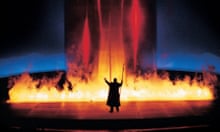To some he will never be more than a narcissist, an antisemite and a misogynist. To others he is an undisputed musical genius and towering intellect.
Richard Wagner, often described as one of the most controversial Germans of all time, will be commemorated – warts and all – on the 200th anniversary of his birth on Wednesday with an exuberant lineup of events including new productions, statues, stamps, coins and books.
Across the musical world and especially in his native land, a deluge of tributes is being paid to the man who still divides as much as he delights Germany.
"Only Jesus, Napoleon and Hitler have had more written about them," said Manuel Brug, cultural commentator with Die Welt, in an appraisal of the mountain of books published to mark the event.
The book that has attracted the most publicity and done much to upset the Wagner aficionados is by none other than the composer's 66-year-old musicologist great-grandson.
Gottfried Wagner has been accused of "fouling his own nest" after condemning his ancestor as a deeply unpleasant character. In his book, You Shall Have No Other Gods Before Me, Gottfried claims that the composer's deep-seated antisemitism and misogyny are to be found throughout his works and that it is time to lay bare his unpleasantness.
"He has been idealised and whitewashed for too long, but has been considered untouchable, which is a mistake," he said in a recent interview.
Gottfried, who lives in Italy, has called on his estranged family to end their long-standing dominium of the Bayreuth festival, the southern German pilgrimage site to which Wagner fans from around the world are drawn each summer. It is currently run by Wagner's great-granddaughters Katharina Wagner and Eva Wagner-Pasquier.
He claims it is still deeply contaminated by the family's connection to the Nazi party – not least due to Wagner's British-born daughter-in-law Winifred, who fostered close relations with Adolf Hitler – and will remain so until the family reveals the extent of its connection with the dictator. He has urged it to finally make public the large amount of private correspondence between Hitler and the Wagner clan, as well as dozens of rolls of private film footage.
Hitler considered Wagner, who died in 1883, to be his favourite composer and had plans to turn Bayreuth into a huge temple to the musician and his music. He took much of his inspiration for his antisemitic thinking from Wagner, who wrote a hate-filled treatise called Jewishness in Music and variously referred to Jews as worms, rats, warts and trichinae (an intestinal parasitic worm).
Modern-day Wagner enthusiasts are adamant that it is possible – and desirable – to separate the man and his music. Christian Thielemann, one of Germany's leading conductors, admitted that Wagner could be extremely unpalatable but argued that the music was untainted by his politics. "C-Major remains C-Major," he insisted.
Thielemann prefers to concentrate instead on the power of the music. "Wagner's music is like a drug, which moves people in a fundamental way," he said.
Those who are moved include much of Germany's political elite, headed by Angela Merkel and her Wagner-enthusiast husband Joachim Sauer, who appear at the festival every year.
Wagner's birthplace, Leipzig, will unveil a life-sized statue of the composer, which many have described as unflattering, reflecting as it does his short stature (5ft 4ins), high forehead, large nose and prominent chin. Its creators say the representation is an attempt not to idolise such a flawed man.
As well as staging a Wagner festival, Leipzig will also play host to a group of international musicologists who are descending on the city to discuss his legacy.
Among the more talked-about Wagner books are one outlining how doctors once considered him to be bad for people's physical and mental wellbeing, another examining Wagner the comic, and one by Joachim Köhler exploring not only Wagner's antisemitism – attributed to the fact that his main musical rivals, Giacomo Meyerbeer and Felix Mendelssohn, were Jewish – but also some of his lesser-known penchants, including his love of performing somersaults and headstands.
Köhler also refers to Wagner's little-known "transvestite-like obsession" with women's clothing, including wearing negligees and silk underwear that he purchased in Paris and stored in a secret room in his house. "There is much about Wagner that remains very little known," Köhler said in an interview.



